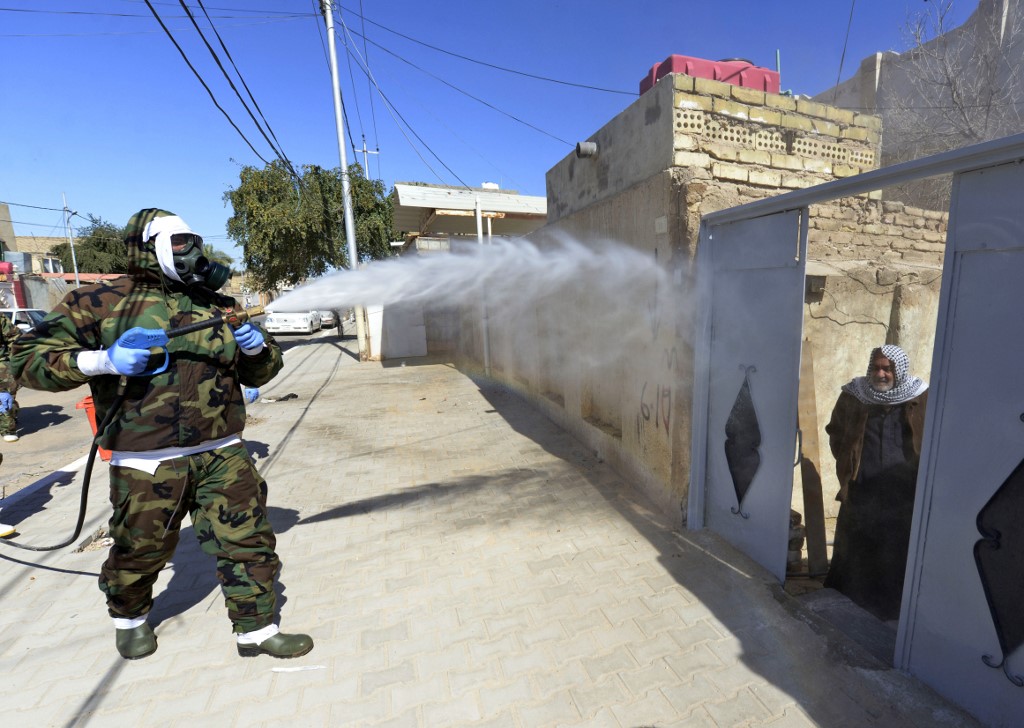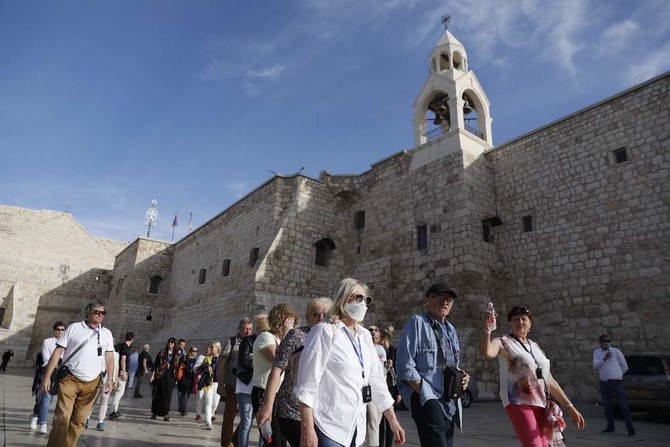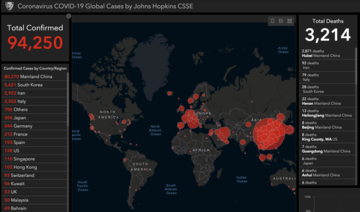LONDON: More cases have been announced across the region on Thursday including in Saudi Arabia, Kuwait, Oman and Egypt.
The UAE has called on citizens and residents to avoid travel due to the outbreak. Meanwhile in Iran, center of the most deadly outbreak outside of China, the death toll rose to 107 people amid 3,513 confirmed cases.
Thursday, March 5 (all times in GMT)
20.15 - The UAE’s health ministry said on Thursday that a 17-year-old Emirati student had been infected with coronavirus and that he has been quarantined.
A statement said that the school attended by the student has been closed and disinfected.
The ministry is also testing those who came into contact with the student for coronavirus.
20:00 - Palestinian President Mahmoud Abbas declared a 30-day state of emergency on Thursday after coronavirus cases were reported in the West Bank town of Bethlehem.
The decree was announced by Palestinian Prime Minister Mohammed Shtayyeh hours after officials closed Bethlehem's Church of the Nativity and banned foreign tourists from West Bank hotels.
17:35 - The first person has died in Britain from coronavirus, the BBC reported on Thursday. The BBC said an older patient with underlying health conditions had died after testing positive for the virus.

A sign directs patients towards an NHS 111 Coronavirus (COVID-19) Pod, where people who believe they may be suffering from the virus can attend and speak to doctors, at St Thomas' Hospital in London on Mar. 5, 2020. (AFP)
17:15 – Number of COVID-19 patients who have died in Italy jumps from 107 to 148 and the number of cases rises to 3,858 from 3,089.
16:20 – The Palestinian government confirmed the first coronavirus cases in the occupied West Bank Thursday. The health ministry said seven cases had been confirmed in the Bethlehem area.

Workers sterilize the ground in front of the Kaaba in the holy city of Makkah, Saudi Arabia, Thursday, Mar. 5, 2020. (AP)
16:04 – Saudi Arabia says the Grand Mosque in Makkah and the Prophet’s Mosque in Madinah will close an hour after the Isha prayer and will open an hour before the Fair prayer.
13:45 – French authorities on Thursday reported two more deaths linked to the coronavirus outbreak in the country, taking the total of deaths to six.
Authorities said in a statement France has also registered 92 new confirmed coronavirus cases, taking the total toll of cases to 377.
Read more - OPINION: No, Qatar is not behind the coronavirus
13:30 – England's final Six Nations encounter against Italy in Rome next week has been postponed amid fears over the coronavirus outbreak, tournament organisers said on Thursday.
13:00 – HSBC has sent more than 100 staff in London home after a worker tested positive for the coronavirus, the first known case at a major company in Europe's main financial hub.
12:53 – Egypt has reported another confirmed case of coronavirus on a citizen who traveled abroad.
12:38 – Iran said new coronavirus has killed 107 people amid 3,513 confirmed cases across the Islamic Republic.
12:21 – Saudi Arabia’s health ministry confirmed three new coronavirus cases in the Kingdom bringing the total number of cases to five. One of the patients had arrived from Iran transiting through Kuwait and passed on the virus to his wife.
12:22 – Iran’s health minister Saeed Namaki said authorities would begin manning checkpoints to limit travel between major cities amid virus.
This video explaining how COVID-19 transmits person to person was produced by the World Health Organisation
12:15 – Iran’s health minister said that schools and universities would be closed until end of the Iranian calendar year on March 20 because of coronavirus.
09:24 – The Palestinian health ministry has declared a state of emergency and recommended the closure of mosques, churches in Bethlehem. Schools were also closed for 14 days and tourism activities were suspended.
09:20 – The UAE has stopped the military training of national and reserve service recruits as a precaution from coronavirus.
08:53 – Iraq announced the cancellation of Friday prayer in Kerbala due to coronavirus. Meanwhile, the country’s Diyala province announced a 50 percent reduction in official working hours.

Above, an Iraqi civil defense staff disinfects a Najaf neighborhood where a recent case of novel coronavirus infection was confirmed. (AFP)
08:21 – Morocco announced its second confirmed case of coronavirus in the country. Local authorities said the patient was citizen who arrived back from Italy.
07:31 – The Kuwaiti Ministry of Health has reported two more coronavirus cases, bringing the country’s total confirmed cases up to 58.
07:31 – Iranian media has reported that the death toll from coronavirus has risen to 483 people.
07:23 – A college in Oman has announced the suspension of classes for two weeks after a coronavirus case was diagnosed.
07:08 – The Health Ministry of Iraq’s Kurdistan region has confirmed two coronavirus cases, taking its total number to eight. Kurdistan’s two fresh cases are from the same family: a 31-year-old man and a 27-year-old woman, who have tested positive for the virus, the ministry said in a statement. Kurdistan on Wednesday confirmed its first death due to the virus.
06:23 – UAE health authorities have called on citizens and residents to avoid travel due to the coronavirus outbreak. Pupils, students and workers in educational facilities will be asked to stay at home for 14 days after returning from travel, state news agency WAM reported.
Opinion
This section contains relevant reference points, placed in (Opinion field)
05:43 – A Turkish Airlines plane was flown back to Istanbul without any passengers onboard Thursday, on orders from authorities in Singapore after a passenger who had arrived on the same plane on Tuesday tested positive for coronavirus.
Singapore’s aviation regulator said that the three pilots and 11 other crew of flight TK54 that had arrived on Tuesday were on the return flight to Istanbul, where they would be placed in quarantine.

A Turkish Airlines aircraft was flown back to Istanbul without any passengers on Thursday on orders from authorities in Singapore. (AFP)
“The crew had come into close contact with a passenger on flight TK54 who subsequently tested positive for COVID-19,” the Civil Aviation Authority of Singapore said in a statement on Thursday. “The Ministry of Foreign Affairs is in contact with the Turkish Embassy, which has confirmed that the crew will be quarantined upon arrival at Istanbul.”
Wednesday, March 4
18:36 – A 16-year-old student of an Indian school in Dubai has tested positive for the coronavirus. The infection was contracted from the student’s parent who had travelled overseas.
Within the framework of comprehensive preventive measures against the spread of #coronavirus, Dubai Health Authority (DHA) is conducting tests and monitoring the students, staff and workers of the school that may have interacted with the coronavirus patient.
— هيئة الصحة بدبي (@DHA_Dubai) March 4, 2020
16:15 – Expatriates from China, Italy, Iran and South Korea living in Oman will not be allowed back to the country if they travel overseas, even if their visas were valid, according to Oman’s Ministry of Foreign Affairs, as part of measures to stop the spread of coronavirus.
Individuals, who are not citizens of these countries, attempting to enter Oman through these four countries will also be barred entry.
Monitor the coronavirus COVID-19 here:
13:25 – Thermometers will be distributed in schools throughout Kuwait as part of the national measures to counter coronavirus, the Ministry of Education said. In a statement, the ministry indicated that a meeting was held with representatives of the health ministry to coordinate efforts in distributing thermometers at schools nationwide.





























